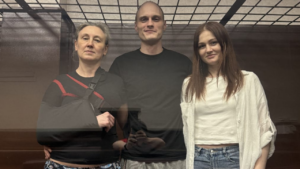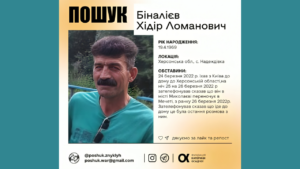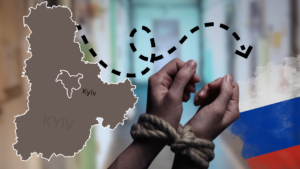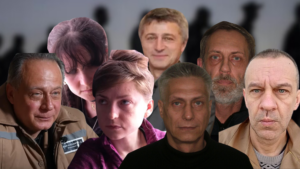He Was Tortured with Electricity and Faced an Attempted Rape. The Story of a Kherson Resident Who Shared a Cell with Kherson Mayor Kolykhaiev and Almost Committed Suicide in Captivity
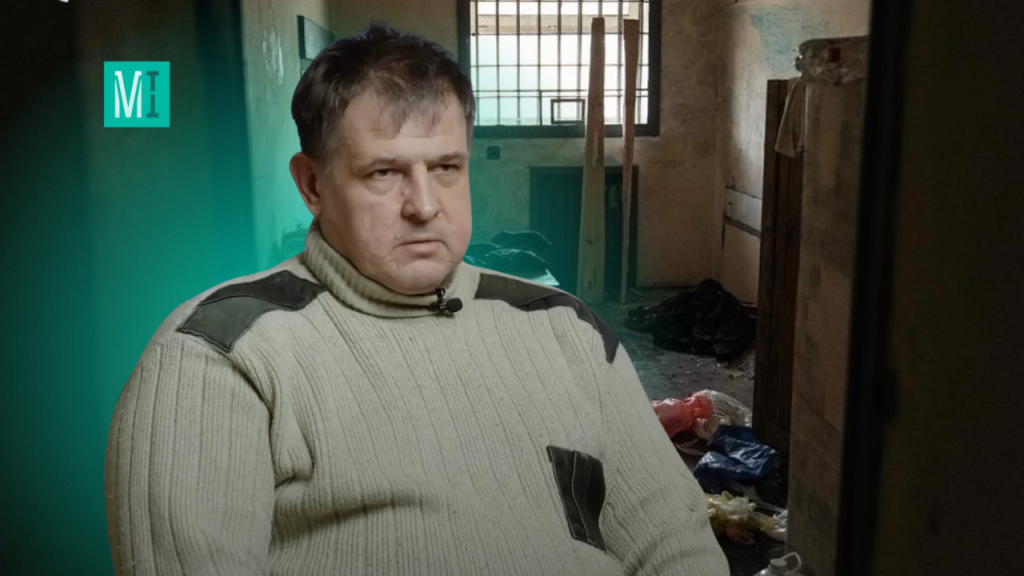
Viktor Soldatov, a system administrator at the Kherson Shipyard, spent exactly nine months in Russian captivity. In an interview with MIHR, he shared his experience of the occupiers’ abuse of him, his cellmate Ihor Kolykhaiev, the Mayor of Kherson, his unexpected release, and the health issues he faced after the torture.
— Get on your knees! Face the wall, cross your legs! — a voice commanded in Russian through the small window in the door. The two men obediently followed the orders. The door opened, and several men in balaclavas entered the cell.
They grabbed one of the prisoners, taped his hands with adhesive tape, and led him to another room on the same floor for interrogation. Without any explanation, they attached ‘crocodiles’—clamps for electric wires—to his ear and the little toe of his right foot. The man was asked about his connection with the Security Service of Ukraine. At that very moment, he received the first electric shock. The prisoner responded that he had no connection with the SBU.
The second question was about his connection with the Ukrainian Armed Forces, followed by another electric shock. The man denied this as well. That time, he was abused for another 40 minutes. The next day, it all happened again. And the day after that—once again.
Viktor Soldatov, a 50-year-old system administrator at the Kherson Shipyard, spent exactly nine months in Russian captivity.
Life under Occupation
— It wasn’t even 5 a.m. when my friends called and said, ‘Wake up, a war began.’ But I didn’t believe them; I thought it was a joke. — Viktor recalls the events of February 24, 2022 [from this point, Soldatov’s account is translated from Russian].
As usual, he left for work at 7 a.m. and saw smoke coming from the direction of Chornobaivka. He later discovered that the Russians had launched missiles at the military airfield in a village 10 kilometers north of Kherson.
At the plant, they began destroying paper documents while Viktor, in his turn, was ‘cleaning up’ electronic storage devices.

The airfield in Chornobaivka immediately became a target for the Russians. After the occupation began, they started using it to deploy their equipment
For nearly another six months, the man continued to go to work. Viktor explains:
— Only critical services remained [operational] at the shipyard, for example, the sewage pumps to prevent flooding; the island [Quarantine Island in Kherson, where the shipyard is located] is low-lying with high groundwater level, so water must be constantly pumped out. I was responsible for keeping the accounting department running, which managed payroll.
The Russian military appeared at the plant several times. The first instance was in June 2022, when the occupiers claimed that a drone had allegedly been launched from the plant’s territory, and they were searching for those responsible. They seized all employees’ mobile phones to check their correspondence and contacts.
After that, on Soldatov’s account, representatives of the Russian security services came to ‘talk’ to the accountant. The conversation was brief:
— Have you destroyed the documents?
— Yes, they have been destroyed.
— Well, we see.
With that, they left.
At the same time, in Kherson groups on Viber and Telegram, reports started emerging about people going missing—the Russian purge of the city was escalating.

The Media Initiative for Human Rights has identified over 1,700 civilians abducted by the Russians during the occupation and illegally detained in their prisons and detention centers
On August 17, they came to Viktor himself.
— Open the door, it’s the police! — He heard a banging on the door at 7 a.m.
Four men stood at the threshold—two in balaclavas and two without, but all in military uniforms without insignia. One of the men was carrying a sledgehammer — if Viktor hadn’t opened the door, they would have broken it down anyway.
The military informed Viktor he had to follow them to answer a few questions. He asked if he should turn off the water and gas in his apartment, trying to gauge what to expect and how long he might be detained.
— Nothing like that. You’ll be home by evening, — Viktor was assured.
But he did not return home that evening.
Interrogations
Viktor Soldatov was brought to the Main Directorate of the National Police of Ukraine in the Kherson region at 4 Kirova Street (now Lutheranska Street). He was placed in a basement cell along with another man named Kostiantyn, who had been detained in Oleshky.
The room had no toilet, no water, and no ventilation. From time to time, Viktor could hear the screams of people who must have been tortured on the same floor.
He was taken for the first interrogation the following morning, a day after his detention. Without any preliminary questioning, they began torturing the Kherson resident with electric shocks, asking about his connections with the Security Service of Ukraine and the Ukrainian Armed Forces.
— But what connections could I have? I had no connections at all. I didn’t serve, and my relatives didn’t serve either. No one was conscripted, — Viktor shares with MIHR.

Viktor Soldatov, former civilian hostage of the Russian Federation. Photo: Slidstvo.info
Viktor felt the interrogation lasted an eternity, but later, his cellmate told him he had returned after forty minutes. On the second day of questioning, the Kherson resident was beaten with batons—mainly to his abdomen under the ribs and to his legs above the knees. Several times, he was also hit in the neck.
Viktor recalls that he was beaten not by one person but by three or four men at the same time. This time, they asked him how he started working as a system administrator at the shipyard and who had brought him there.
— As I later realized, there is a practice in Russia where all IT professionals, especially those working at state enterprises, are considered ‘FSB agents’ [referring to unofficial collaboration with the Russian security agency]. They believe there’s some arrangement for leaking information. And they thought it was the same with us, — Viktor explains the Russians’ interest in him.
Among other things, they demanded to know where to find the information of the shipyard’s human resources department, as all data on the hard drives had been destroyed. The man replied that it was a different department to which he had no connection.
For torturing Viktor Soldatov, the Russians also used a plastic bag: they put it on the head of a civilian hostage immediately after the electric shock.
— When you receive a shock, you exhale, and the first thing you instinctively do when the electricity is turned off is to inhale. At this moment, the bag is placed on your head. — Viktor recounts the abuse he endured.
At the same time, clamps of electric wires were also connected to his genitals and nipples.
He also recalls other forms of torture, such as being doused with water until he began to choke. The Russians called this procedure ‘diver.’
In Viktor’s mobile phone, seized during the search, the Russians found the contact of his sister, Olena, who lives in Mykolaiv.
— Does she love you? — Viktor was asked during one of the interrogations.
— Well, probably, — he replied.
— Does she want to see you alive?
— Yes, I guess she does.
— Then let’s call her now and tell her that if she wants to see you alive, she should go around Mykolaiv and tell us where the military is stationed and where the [Ukrainian Armed Forces] equipment is located. — The Kherson resident’s tormentors demanded.
However, Viktor refused. The Russians then beat him until he lost consciousness.
After the third interrogation, when the occupiers still did not obtain the information they wanted from Soldatov, they placed the Kherson resident face down on a table, removed his shorts, and threatened to rape him with a baton.

The Main Department of the National Police of Ukraine in the Kherson Region, where Viktor was tortured by Russians
Viktor vomited, after which he was struck hard in the face and fainted.
— I came to when they were hitting me on the cheeks and lifting me off the floor, — the man recounts.
After that, Viktor was returned to his cell. However, the stress he had experienced took its toll. At night, the man pulled a nail from the rotting floor and attempted to cut his throat with it. In the morning, his cellmate saw the bloodied man and called the guards. Viktor’s suicide attempt astonished the occupiers and, surprisingly, concerned the occupiers.
— About 20 people rushed in, — Viktor recalls. — They set up a drip and administered an injection—most likely a powerful antibiotic because everything healed within a week. They asked me, “Why did you do this? Were you beaten? Did they beat you badly?”
The next day, Viktor was left alone, but then he was brought back for questioning by the same people who had tortured him. This time, there was no beating, abuse or humiliation. The man was again asked why he wanted to take his own life and promised that everything would be fine.
The next day, August 23, Viktor Soldatov was transferred to the temporary detention facility on Teploenerhetikiv Street. He stayed there until October 20, 2022. He was never called in for interrogation during that time.
— They put me there and seemed to forget about me. — The Kherson resident continues.

A cell in the Kherson temporary detention center, where people may have been tortured. Photo: Suspilne
During his stay there, 22 people passed through cell No. 8, where Viktor was held. He recalls that they were constantly taken for interrogation.
Kolykhaiev
The rapid counteroffensive by the Ukrainian Armed Forces in the autumn of 2022 drove the invaders from the right bank of the Kherson Region. However, they took civilian detainees with them as they retreated.
On October 20, a group of Ukrainians held in the detention center on Teploenerhetikiv Street were transferred by Russians to the occupied town of Hola Prystan.
Viktor, along with 11 other prisoners, was placed in a cell designed for three people. For the first four days, the detainees were not given any food. On the fifth day, they were given borscht and bread. Once or twice a day, the prisoners were taken outside for a walk in the yard.
In Hola Prystan, a group of 60 Ukrainians who were brought from the Kherson detention facility was held for ten days. On October 30, they were taken further and separated. Soldatov was sent to the local district police department in occupied Chaplynka in the Kherson region.
— There was also a three-person cell there, but there were ten of us, — the Kherson resident recalls. — The cell had neither water nor a toilet. Instead of a toilet, a hole was dug in the floor, so the floor was actually earthen.
Viktor spent the next six months in this cell. It was there that he met the Mayor of Kherson, Ihor Kolykhaiev, who was taken prisoner by the Russians on June 28, 2022. The first person to report Kolykhaiev’s abduction was his advisor, Halyna Liashevska. She later explained that the official was detained near one of the municipal facilities where city council employees were working. The occupiers seized hard drives from computers and searched safes. After that, the head of the occupied regional center was placed on a bus marked with the letter “Z” and taken away in an unknown direction.

Ihor Kolykhaiev, Mayor of Kherson.
On Soldatov’s account, Kolykhaiev was held in the same cell as him until November 25, 2022.
— I used to flick him on the forehead for losing at chess, — the former prisoner recalls.
Viktor notes that the mayor, who looked thin and exhausted, did not talk much about his detention. He mentioned, among other things, that he had spent 114 days in solitary confinement at the Temporary Detention Facility on Teploenerhetikiv Street.
On November 25, Kolykhaiev was taken away, but Viktor doesn’t know where.
Release
On May 17, 2023, the Russians released Viktor Soldatov. It happened unexpectedly, even for him.
— I think the Russians underwent a rotation, — the Kherson resident speculates. — New ones came in and started looking at who they had and what profit they could get from them. They realized they couldn’t gain anything from me, as they didn’t even have any documents on me.
During his captivity, the occupiers never initiated any criminal case against Viktor, nor were any official charges brought against him.
— They just kicked me out of the district police station with the words, “It’s time you stopped eating our food,” — the man recalls.
Fortunately, the Russian forces returned the documents they had seized from the Kherson resident on the day of his detention: his internal and international passports. They also gave back the keys to his apartment.

Chaplynka checkpoint. This village became the fourth place where Viktor Soldatov was held
Ihor Novosilskyi, rector of the Tokarivka Church of St. Princess Olga in the Kherson Region, was released along with him. He, in turn, turned to a local priest for help in leaving the occupied region. A carrier was found for the men, who took them to Latvia.
From there, Viktor returned to Kherson, which had already been liberated by Ukrainian troops. After a continued stay in captivity, the man underwent a medical examination and finally visited a dentist. The doctors removed ten of his teeth—more precisely, what was left of them after the torture in the first days of captivity. The teeth had crushed during electric shocks when he clenched his jaws.
After such torture, he also developed a tremor in his hands; however, the doctors promised that it would disappear over time.
Nevertheless, physical health problems cannot be compared to the consequences for the mental state of a former prisoner.
— I realized that [alone] among four walls, I would either drink myself to death or go out and try to punch someone’s face. — The man shares his personal experiences.
In one of the Telegram channels, Viktor saw an announcement about free psychological assistance from the ‘Blue Bird’ Foundation and decided to take advantage of the offer. After that, the resident of Kherson worked with a psychologist from September 2023 to March 2024.
— I wouldn’t say that I don’t think about [what happened], but I probably don’t view it as dramatically as I used to, — he adds.
Supported by a grant from the Open Society Foundations.
Authors: Yevheniia Korolova, Maryna Kulinich


